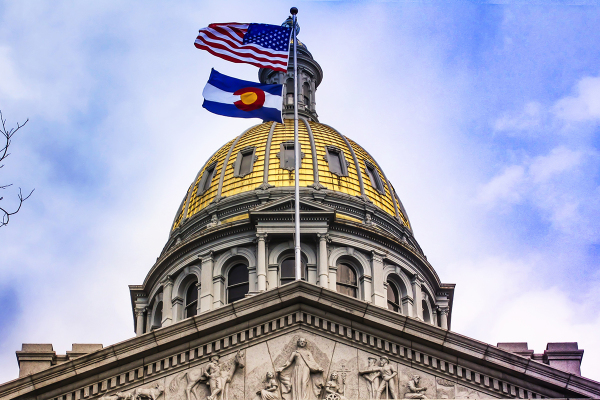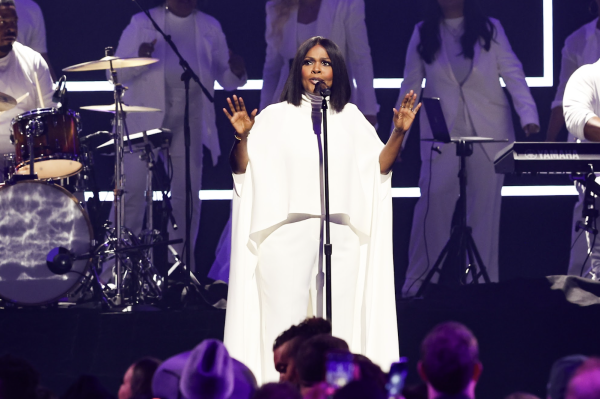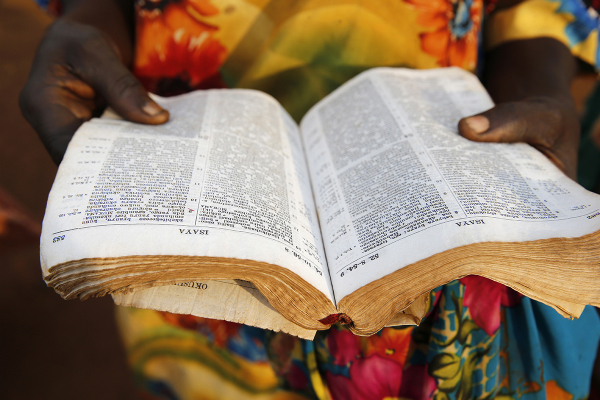Ben Carson Defines Himself and Makes Big Impression at NAN Convention in NYC; Pastor A.R. Bernard Says He's a 'Leader'
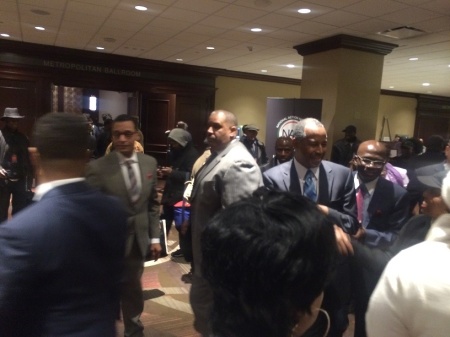
NEW YORK – A few hours before renowned neurosurgeon and potential GOP presidential candidate Dr. Ben Carson arrived at the Al Sharpton-led National Action Network's annual convention in New York City on Wednesday morning, people were reacting to the mere mention of his name, like a foul odor in a locked and crowded room.
By the time Carson, 63, was finished speaking to the same crowd later that evening, however, many were clamoring to shake his hand.
The country will have to wait until early May to find out whether or not Carson will run for presidential office in 2016, but until then, Carson has been quietly making the rounds, whittling away at public misconceptions about who he is, to define the man he wants America to see — the patriot, the Christian, the family man who believes in hard work, common sense and diversity.
In introducing Carson to the crowd Wednesday evening, A.R. Bernard, a political kingmaker in New York City and senior pastor and founder of the Christian Cultural Center megachurch in Brooklyn, called him "a leader."
"After 36 years of pastoring in New York City, I discovered there are four things God wants from a man: maturity, decisiveness, consistency and strength. After 43 years of marriage, I've discovered there are four things women want from a man: maturity, decisiveness, consistency and strength. I also discovered that the four things that men struggle with in life are: maturity, decisiveness, consistency and strength," Bernard said to laughter.
"But what I really discovered is that these are the qualities that people look for in a leader. Dr. Carson is one of those leaders," he said.
At the end of his soaring, sober and inspiring oratory, Carson had convinced at least one man in the crowd that he was worthy of his vote if he should ask him for it.
"He's got my vote," New Jersey resident Clayton Young said after hearing Carson speak Wednesday.
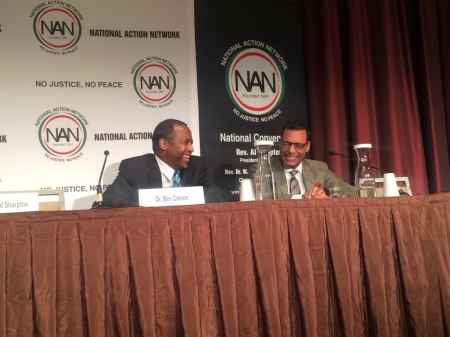
Young's reaction was a far cry from the mood the crowd was in at the event on Wednesday morning inside the Metropolitan Ballroom at the Sheraton Times Square Hotel where the very idea of Carson being president of the United States seemed anathema.
That morning, in his opening statements at the convention, Sharpton had slowly eased in the mention of Carson's pending appearance in a conversation about the day's events like a disdained cousin. He explained that he disagreed with the conservative star on many issues and even quipped that he didn't believe that they agreed that "today is Wednesday." He urged his followers, however, to respectfully listen to what the retired neurosurgeon had to say.
"We had Newt Gingrich here one year. So we're going to hear [what Carson has to say,] and they want us to heckle and boo. Everyone is wondering: Why is he going to get booed? We're going to show him we can listen. And we make intelligent decisions. … You cannot deal with putting things on the agenda in 2016 elections unless those that are running can be heard and then have to hear us. Is that alright?" asked Sharpton.
The crowd groaned reluctantly in the affirmative on having to listen to a man many had come to view as an "Uncle Tom."
But as Carson strolled in along with Sharpton and Bernard that evening, the room filled up and a palpable sense of curiosity enveloped the air.
"Dr. Ben Carson and I don't agree on a lot. We probably don't even agree that today is Wednesday," said Sharpton as the crowd waited to hear from the doctor. "I have always respected and admired what he did in the medical field. He is truly someone that I respect, and I respect the fact that even though we disagree on politics and on the president and other things that I believe, he was sincere in what he said. … I do expect people to say what they believe and be sincere."
When he was done, everyone was laughing and seemed at ease until pastor Bernard got up to introduce Carson. As Bernard relayed Carson's rags to riches narrative the audience hung on to every detail in surprising reverence, punctuating it with only cheers when his inspiring story moved them to do so.
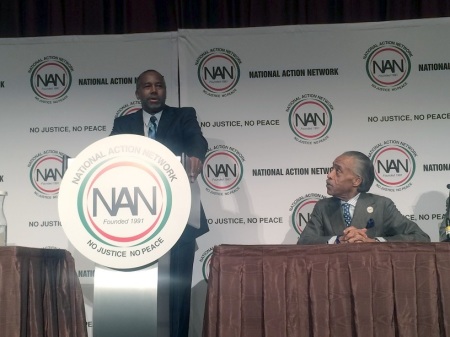
Carson's Message
Then Carson got up and assured Sharpton that he wasn't going to say anything bad and went right into what he had come to say with the precision of a surgeon in the operating room.
"You know America remains a place of dreams. You have a lot of people with dreams who are trying to get into this country. Not too many people trying to get out of here, so that means it's still a pretty good place," he began.
"As a youngster I dreamed to become a physician. And that was perhaps a lofty dream considering where I was coming from. But still one that I was able to accomplish. And one that I think young people today can still accomplish if they believe that they can do it and not that they are different," Carson said.
He then relayed the rest of his message intricately stitched in his impressive narrative and assured the crowd that he understood what it's like to struggle — something considered a staple experience in many black and minority communities across America.
"Typical tenement. Large multi-family dwelling. Boarded up windows and doors ... gangs, you walk into a dark room and turned the light on it looked like the walls were moving there were so many roaches. Big rats, water rats … and a tremendous amount of violence," said Carson, about the house he and his mother and brother shared with his aunt after his mother divorced his bigamist father.
"I remember seeing people lying in the street with bullet holes. Both my older cousins who we adored were killed. I remember both my older cousins being beat severely because they would get into trouble with the police a lot," he said.
"And you know, speaking of police, this situation with Walter Scott in South Carolina. You know I viewed that video with the same horror as I'm sure everyone here did. I was aghast that an execution could have occurred without a trial in the streets of America," he said to cheers.
On Public Assistance
Further highlighting his kinship bona fides with the community, Carson explained that while his mother, who was a domestic worker, accepted public assistance, she was able to stay off it for the most part.
"Some people have criticized me, saying, 'Carson grew up poor he must have had some public assistance and now wants to [withdraw] all the safety nets.' Let me tell you something: that is a blatant lie that's not anything I would want to do or have ever said. What I would like to do, however, is create a system that allows people to move from a state of dependency to a state of independence." The crowd cheered.
"And I think the policies we enact, need to do exactly that. If you look at Mohammad Yunus, who won the Nobel Prize in 2006 for his micro lending program, [it] lifted millions of people out of poverty in Bangladesh and that part of the world. Ninety-seven plus percent of those people have paid their loans back and have become independent. Now, we're smart people in this country, and we need to learn how to invest in our fellow man because it's those relationships and those investments that raise people out of a state of dependency. And that is something that we all can get involved in," he explained.
"We need to stop listening to all the people who try to engender division and class warfare. You know what we have right now? People in this world, random folk, Islamic terrorists who want to destroy us and our way of life. We don't need to aid them by fighting each other and trying to destroy each other," he said to continued cheers.
Carson added that the growth of the U.S. economy is not good enough at the moment and criticized a lot of the jobs being created as "chicken jobs."
"What we really need to be concentrating on is our economy and how do we get a robust economy. From 1850 to 2000 our economy grew at a rate of 3.3 percent, on average. From 2001 until 2014, 1.8 percent. The long term forecast by the fed now is for 2.4 percent … but I don't believe that is good enough," Carson asserted.











